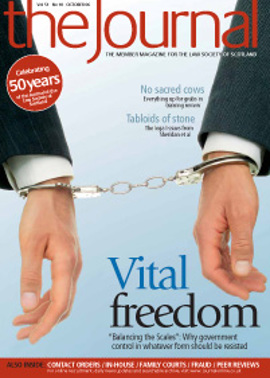Scottish Solicitors' Discipline Tribunal

Eileen Dommer
A complaint was made by the Council of the Law Society of Scotland against Eileen Dommer, formerly of Mesdames Eileen Dommer and Company, 87 Commercial Street Dundee (“the respondent”). The Tribunal found that certain aspects of the complaint were irrelevant and lacking in specification and dismissed the complaint.
The complainers averred that the respondent acted in a dishonest fashion by portraying to a fellow solicitor, her client’s husband and the bank that she was not obliged to redeem three staff purchase loans. The minute of agreement entered into between the separated spouses, who each had separate legal advice, referred to the mortgage being repaid. The minute of agreement made no reference to any unsecured loans. It was clear to the Tribunal that all the parties involved were under the mistaken impression that there was a mortgage over the property. It only became clear to the respondent at a later date that there was no mortgage. At this point the respondent was presented with a difficult situation. The respondent’s client’s instructions were that the unsecured loans should not be repaid. The Tribunal could not accept that the intentions of the parties outweighed the terms of the minute of agreement as the terms of the minute of agreement were quite clear and it had been entered into by both parties who had separate legal advice. The Tribunal accordingly did not see how the respondent could have been said to have been acting dishonestly by not acting in the spirit of the agreement, negotiated with the benefit of counsel, when there was no mortgage to be redeemed although expressly required in terms of the minute of agreement. The Tribunal noted that the respondent had placed the money on deposit with the bank in an account designated in her name on behalf of her client. By doing this she had not prejudiced either the bank or either of the separated spouses. The Tribunal also found that there were no instructions given by the bank to the respondent and the respondent could not accordingly be said to have been acting on behalf of the bank in an agent/client relationship. The Tribunal did consider the question of whether or not the respondent breached an undertaking given to the bank when she indicated that she wished to borrow the title deeds from the bank and that they would be held on the bank’s usual borrowing terms and conditions pending redemption of the mortgage account in full. The Tribunal however considered that the undertaking given was not unequivocal or unambiguous. The letter was clearly sent under the mistaken impression that there was a mortgage over the property. The Tribunal accordingly found that there was no consensus between the bank and the respondent in connection with any undertaking and the respondent could accordingly not be guilty of breaching an undertaking. The Tribunal accordingly found various aspects of the complaint to be irrelevant or lacking in specification and what was left could not amount to professional misconduct.
David Robert Seagrave
A complaint was made by the Council of the Law Society of Scotland against David Robert Seagrave, Messrs Seagrave & Co Solicitors, Amulree, Islesteps, Dumfries (“the respondent”). The Tribunal found the respondent guilty of professional misconduct in respect of his failure to ensure the timeous recording of conveyancing deeds and his breach of rules 6, 8, 9, 10, 11, 14 and 24 of the Solicitors (Scotland) Accounts etc Rules 2001. The Tribunal censured the respondent and directed in terms of section 53(5) of the Solicitors (Scotland) Act 1980 that for a period of five years with effect from 30 April 2007 any practising certificate held or issued to the respondent shall be subject to such restriction as will limit him to acting as a qualified assistant to such employer as may be approved by the Council or the Practising Certificate Committee of the Council of the Law Society of Scotland, with a further condition that while the respondent is in private practice on his own account his practising certificate will be subject to a condition that the books and records of his practice be inspected by the Council of the Law Society of Scotland no later than 1 August 2006 and thereafter at four-monthly intervals, all such inspections to be at the expense of the respondent.
The Tribunal took account of the fact that the failure to record deeds and breaches of the Money Laundering Regulations all related to clients dealt with by the respondent’s associate rather than directly by the respondent. The respondent however, as the sole partner, had responsibility for supervising his associate. The respondent’s failure to do so in this case was a complete abdication of his responsibility. The Tribunal was extremely concerned by the number of instances of non-recording of deeds. This exposed the purchasers and heritable creditors to significant risks. The Tribunal however took account of the fact that the respondent was winding down his business and had given an undertaking that he would be retiring on 30 April 2007. The Tribunal also took account of the fact that the respondent may have had difficulties with his associate not co-operating with him after the Guarantee Fund Committee meeting. The Tribunal noted the references provided on behalf of the respondent and his previous good character. The Tribunal accordingly agreed to allow the respondent to continue in practice until his retirement date subject to further inspections of his practice at four-monthly intervals. The Tribunal was also concerned to protect the public by ensuring that the respondent did not continue as a sole practitioner after April 2007 and accordingly imposed a restriction on his practising certificate for a period of five years commencing 30 April 2007.
In this issue
- TUPE passes the buck (1)
- Survival of the fittest? A reply
- Channels of communication
- Time to discard the PIPs
- Speaking in the public interest
- Education's Big Bang
- If you can't say anything nice...
- Lesbian families, parenthood and contact
- Keep it in the family
- End of the peer show
- New chambers challenges Faculty Services
- Cash without borders
- Fraud - the threat from within
- Note it down - or lose out
- Balancing privacy and data sharing
- Provoking argument
- To amend or not to amend?
- Purchases under test
- TUPE passes the buck
- Scottish Solicitors' Discipline Tribunal
- Website reviews
- Book reviews
- Law or regulation? The blurring gets more blurred
- Registers success with direct debit






